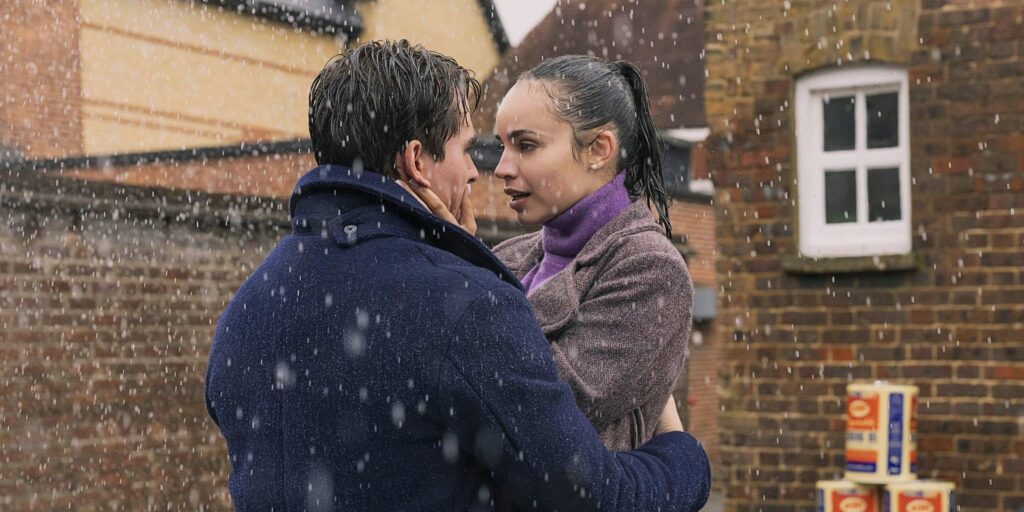Warning! Spoilers ahead for My Oxford Year!My Oxford Year is the latest in a long line of Netflix rom-coms that encourage the audience to seize the day and are unafraid to use tragedy and emotional shorthand to elicit a response. Starring Sofia Carson and Corey Mylchreest, two repeat Netflix darlings who starred in The Life List and Queen Charlotte: A Bridgerton Story, My Oxford Year is a fantasy that punches above its weight in terms of theme and story. Based on the book by Julia Whelan, the film makes some updates to the novel’s narrative, but this doesn’t make it any more worthwhile.
Instead of contenting itself with being a pure romantic fairy tale, My Oxford Year must put its characters through heart-wrenching revelations, which come off as melodrama for the sake of melodrama. Anna and Jamie, our romantic leads, meet in the hallowed halls of Oxford University and almost instantly embody several of the most popular romance tropes. They’re enemies-to-lovers; Jamie’s her professor, and he’s a player who has a soft spot for her. In terms of checking all the boxes of the modern romance plot, My Oxford Year does its best work.
My Oxford Year Favors Romanticization & Plot Twists Over Thoughtful Storytelling
Despite Its Drama & Tragedy, My Oxford Year Fails To Make Us Care
Most everyone who seeks out Netflix’s new rom-com will be a sympathetic audience. This is important for My Oxford Year, as the film relies on the viewer’s forgiveness from the jump. In terms of character, Carson has the more difficult job. She has to make our everywoman protagonist someone fully developed and nuanced, instead of yet another romantic leading woman who’s simply the audience’s stand-in. Conversely, Mylchreest gets to sit back and be tragically romantic and handsome, which is a role he doesn’t struggle to fulfill.
After establishing the apparently inevitable nature of Anna and Jamie’s relationship and the undeniable nature of their chemistry (which is debatable), My Oxford Year skips through almost the entire 365 days with a montage. Though we’re rooting for Anna and Jamie because we enter the story expecting them to fall in love, we miss the meat of their relationship. When Anna decides she’s ready to stay in England forever and be a pseudo-widow before her life really starts, the audience is left wondering why.
Their chemistry is strong enough to be believable, but there’s no tangible justification or demonstration of why exactly these characters love each other. They share an interest in poetry, and Anna wants to live out her literary dreams of getting involved with a disgustingly wealthy British Lord, but this isn’t the foundation of a long-term partnership. It’s aspirational in a very romance-novel sense, but it fails to hold up under scrutiny when the stakes of their relationship get a lot higher, and the pair throw caution to the wind.
The glasses are neon red, and they’re plastered onto the characters’ eyes with superglue.
The deeper themes of their romance can be boiled down to the message that it doesn’t matter how long something lasts, whether it’s life or love, as long as it’s meaningful. It’s a timeless moral, but difficult to take seriously in the larger context of the film. Most of the dialogue is cringeworthy, bordering on painful, but few viewers will turn on My Oxford Year expecting anything less. The secondary characters of Anna’s eclectic group of fast friends have about two personality traits between them, and have unlimited patience when it comes to listening to Anna talk about Jamie.
Outside the characters and their relationships, there’s an undeniable ideological fault to find in the film. My Oxford Year’s Anna has a self-proclaimed library fetish, but the most annoying part of the narrative is the movie’s unashamed academia fetish. Though My Oxford Year was directed by an Englishman, the predominantly American writing team clearly has a lot of internalized hatred towards themselves and the United States. This is far from unfounded, and I would never be offended by a critique of the States in a film.
However, the wholly uncritical and romanticized version of the U.K. that’s presented doesn’t just view Oxford as idyllic or through rose-colored glasses. The glasses are neon red, and they’re plastered onto the characters’ eyes with superglue. My Oxford Year thinks it takes on the rampant class and race issues that plague academia everywhere– no country is exempt– through a throwaway conversation and an altercation in a pub. Unfortunately, even a junk food romantic comedy should know it has to do a little better than that.
Though The Movie Tries To Make You Cry, It Doesn’t Try To Make You Think
My Oxford Year’s big reveal, that Jamie has cancer, and ultimately will decide not to receive treatment, is an unabashed tear-jerker. There have been better takes on the story of the terminally ill romantic partner, and there have been worse ones, allowing My Oxford Year to sit in a comfortably forgettable middle ground. Most audiences with a heart will be moved by the story’s denouement because My Oxford Year is trying desperately to make you cry. However, this emotional response feels more like a reflex than a reflection of the narrative’s power.
Perhaps it’s not entirely fair to be so hard on My Oxford Year, and I wouldn’t be if the movie didn’t try to take ownership of a genre and story type that doesn’t belong to it. The look and feel of the film are expected and passable, bordering on cozy and attractive at times. However, even with a literary atmosphere and a steamy romance, the fact that My Oxford Year blatantly feels comfortable exploding emotional minefields for narratively unclear reasons clouds its potential success as a basic but inoffensive rom-com.
My Oxford Year will be available to stream on Netflix on August 1st.

My Oxford Year
Release Date
August 1, 2025
Runtime
112 minutes
Director
Iain Morris
Writers
Allison Burnett, Melissa Osborne, Julia Whelan

Sofia Carson
Anna De La Vega

Corey Mylchreest
Jamie Davenport
Carson and Mylchreest have decent chemistry that bolsters the story.
The idyllic, cozy setting will appeal to fans of the genre.
The development of the central romance is rushed, undermining the audience’s ability to care about the story.
My Oxford Year romanticizes academia to an outrageous extent.
The movie relies on melodramatic emotional appeals instead of genuine conflict or a propulsive narrative.

